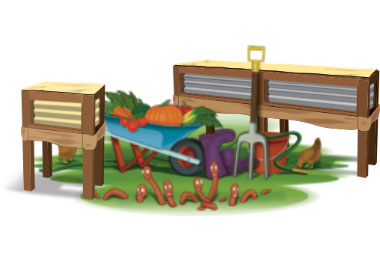02 Jan What Do Compost Worms Eat?
Compost Worms
Compost worms consume any dead decomposed organic matter. You will find these creatures on the ground surface mostly beneath objects such as rocks, timber, mulch etc. Success comes by providing a food source hidden by daylight . Daylight effects the worms nervous system hence the reason why they immediately retreat beneath the surface. Natural light is an effective tool to use in harvesting or farming the little critters.
Will worms eat food scraps?
The answer is yes however microbial activity must firstly take place to decompose or ‘rot’ the food beforehand. Vegetable waste and farmed animal manures are favoured however anything edible by humans will also be consumed.
Hessian carpet underlay and cardboard laid on top of the farm acts as a good dark cover for worms and in time becomes a popular treat. Any cellulose material is generally porous, provides a stable moisture holding platform, shades out light and in turn gets consumed.
Protection from Light
Other forms of protective cover/foods are fallen leaves (large vegetable leaves such as zucchini or pumpkin) are great and lawn clippings work well too. Lawn clippings reach high temperatures in the first two days and should not cover the whole of the farm.It is recommended to provide a safe haven for any matter introduced in to the farm to allow worms to retreat or migrate too.
Coffee waist is also a good food and research also indicates that transposed coffee worm waste is very high in minerals and nutrients for plant health and growth. A ideal scenario for a happy worm farm would be to dispose of ones coffee pot of cold water in to the compost farm daily. This is especially true during summer temperatures.
How much food scraps do worms eat?
Research indicates ‘Up to their body weight per day’. Approximately 4000 worms = 1 kg. Therefore 1 kg of worms can consume 1 kg of food waste. This would be in ideal conditions such as a good pH neutral bedding material, oxygen i.e. air flow through the farm, plenty of moisture and enough food. The real answer is dynamic in terms of what are the present conditions? Compost worms continuously breed depending on the above as well as surface area. A domestic farm limits the final mass number of worms however most products used for households can contain a large enough population to transpose food waste from a a family of five.
Like any Farmer, one needs to consider that a domestic worm compost farm contains live animals in an unnatural environment. If handled with care you can achieve great results in terms of reducing landfill whilst having access to rich liquid and vermicompost for your own garden. Managing a worm farm during hot weather or going away on holidays etc need to be taken into consideration. A friendly neighbor to water a feed them perhaps?

Mark Stewart
Posted at 05:48h, 08 Marchlove your worms, great service
John Murphy
Posted at 04:53h, 06 AprilAre all forms of citrus peel good food for worms
Tony McCarthy
Posted at 13:17h, 08 AprilHi John. Citrus is fine if you blend it in to small particles
Richard
Posted at 04:25h, 14 FebruaryThanks for the great advice Tony…and the easy to pickup bag of worms!
Tony McCarthy
Posted at 21:48h, 14 FebruaryThank you Richard